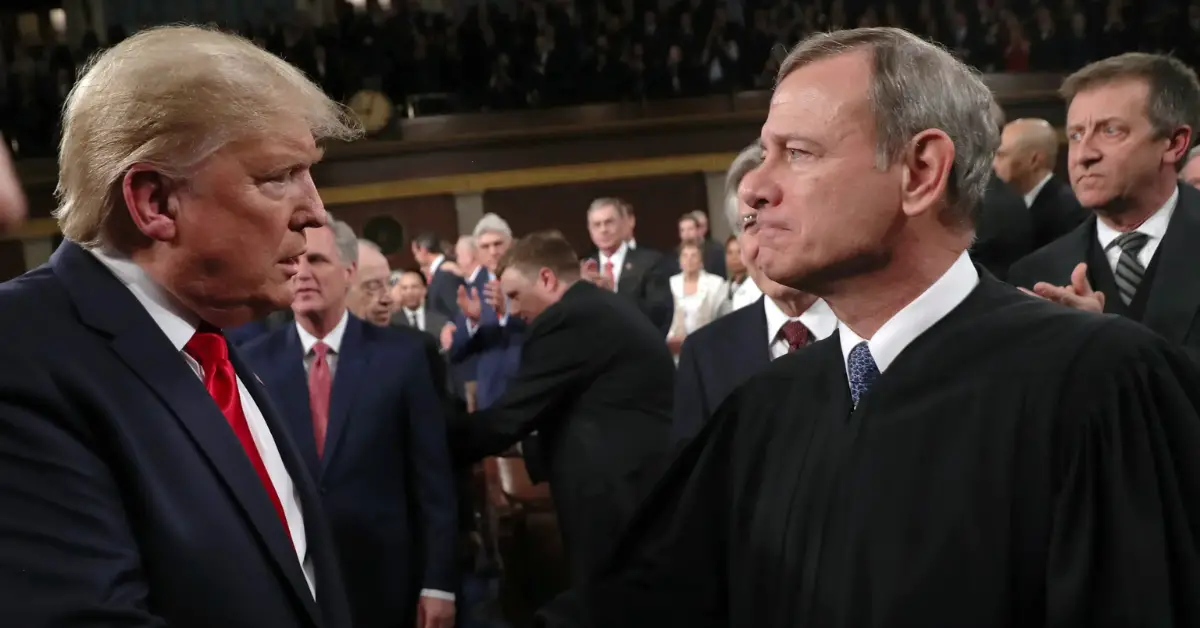Chief Justice John Roberts of the U.S. Supreme Court appears to have aimed a pointed critique at former President Donald Trump, highlighting the growing tension between the judiciary and the Trump administration.
Roberts, known for his measured and cautious demeanor, made remarks that suggested a shift in his tone toward Trump and his legacy. This surprising move has sparked widespread debate and raised questions about the relationship between the judicial system and the executive branch, particularly in the context of Trump’s influence on American politics.
While Roberts has long been seen as a cautious figure, seeking to maintain the integrity and impartiality of the Supreme Court, his remarks indicate a subtle but significant shift. The statement, though brief, was framed in a way that left little room for misinterpretation. It suggested that certain actions taken by the Trump administration may have overstepped the boundaries of constitutional norms. But what exactly did Roberts mean by these remarks, and how might they affect the future of U.S. politics?
A Rare Public Statement
Roberts’ comments came during a speech in which he addressed the current state of the judiciary and its role in a divided political climate. It’s uncommon for a sitting Supreme Court Justice to openly criticize a former president, especially one who has been a dominant figure in U.S. politics for years. However, Roberts’ statement was not just a political jab; it was an appeal to the future of the judiciary and its duty to remain independent and impartial.
The comments did not mention Trump by name but were clearly directed at the impact his policies have had on the public perception of the judiciary. Roberts emphasised the importance of the courts as a neutral body, ensuring that the rule of law remains above the political fray. He seemed to caution against any attempts to undermine the integrity of the judicial system, warning that such actions could lead to long-term damage to the nation’s democratic institutions.
The Growing Divide Between the Judiciary and Trump
The divide between the judiciary and Trump’s administration has become increasingly apparent over the past few years. Trump’s numerous legal challenges, his contentious relationship with the media, and his overall approach to governance have all contributed to the tense environment in which the courts are operating. Many of Trump’s policies, especially those surrounding immigration and executive powers, were often met with judicial challenges that saw the courts acting as a counterbalance to the president’s actions.
Roberts, who was appointed by President George W. Bush in 2005, has often been seen as a conservative but one who values judicial independence. His role has been especially crucial in maintaining the balance of the Court, particularly during moments when his vote could sway important rulings. Despite his conservative leanings, Roberts has often sided with the liberal justices in cases where he believed that the Constitution required a more neutral interpretation.
However, with the rise of Trump’s populist rhetoric and the subsequent influence he had on the judiciary, Roberts found himself in an increasingly difficult position. While Trump appointed three conservative justices to the Supreme Court—Neil Gorsuch, Brett Kavanaugh, and Amy Coney Barrett—Roberts himself remained somewhat of an unpredictable force within the Court. His opinions have often demonstrated a commitment to the Constitution over partisan politics, which has earned him respect from both sides of the aisle.
The Implications of Roberts’ Remarks
So, what does this recent swing at Trump mean for the future of American politics and the judiciary? For one, it indicates that the tensions between the judicial system and the executive branch are not likely to dissipate anytime soon. Trump’s influence over the Republican Party and his ongoing legal battles suggest that the issues surrounding his presidency will continue to shape the political landscape for years to come.
Roberts’ remarks could signal an attempt to reclaim the independence of the judiciary from what many have described as the “Trump era” of politicized courts. With the former president facing multiple legal challenges and a significant number of his policies still under scrutiny, Roberts may be positioning himself as a defender of the judicial system’s impartiality. By publicly addressing the issue, Roberts has sent a message that the judiciary will not simply bow to political pressure, regardless of the individual in power.

Another important takeaway from Roberts’ comments is the potential for increased scrutiny of judicial appointments in the future. Trump’s three appointments to the Supreme Court were a significant moment in his presidency, but Roberts’ public remarks indicate that the future of judicial appointments may not be as easy as Trump’s allies might have hoped. As the political climate continues to evolve, it’s clear that the courts will remain a central point of contention between the executive and legislative branches.
The Role of the Judiciary in American Democracy
Roberts’ statements come at a critical time for the American judicial system. The courts have increasingly become a battleground for political ideologies, with partisan divisions often dictating the outcomes of major cases. The independence of the judiciary has been a cornerstone of American democracy, and Roberts’ comments underscore the importance of protecting that independence.
In the wake of Trump’s presidency, many have expressed concerns about the long-term consequences of his influence on the judiciary. Some fear that his appointments could lead to a Supreme Court that leans too far to the right, potentially undoing decades of legal precedents related to civil rights, abortion, and environmental protections. Others worry about the politicization of the courts and the erosion of public trust in the judicial system.
Roberts’ comments, however, suggest that the courts are aware of these concerns and are actively working to maintain their neutrality. While the justices themselves may have differing political views, Roberts’ remarks indicate a shared commitment to upholding the integrity of the judiciary.
What’s Next for the Supreme Court?
Looking ahead, it’s clear that the relationship between the courts and the executive branch will remain a crucial issue for the future of American politics. As Trump continues to wield significant influence over the Republican Party, his impact on the judicial system will be a key point of debate in future elections and legal battles.
Justice Roberts’ recent statements have brought attention back to the role of the judiciary in the face of political pressure. While it remains to be seen how this will all play out, one thing is clear: the courts will continue to serve as a crucial check on executive power. Roberts’ comments could mark the beginning of a new chapter in the ongoing struggle to preserve the independence of the judiciary and ensure that it remains a neutral body, free from partisan influence.
In the end, the remarks made by Justice Roberts could be a pivotal moment in the ongoing battle for the soul of American democracy. By taking a clear stand against the overreach of political power, Roberts is reinforcing the importance of judicial independence and sending a strong message to future administrations. As the political landscape continues to shift, the courts will undoubtedly play a central role in shaping the future of the nation.
Disclaimer: This article has been meticulously fact-checked by our team to ensure accuracy and uphold transparency. We strive to deliver trustworthy and dependable content to our readers.




